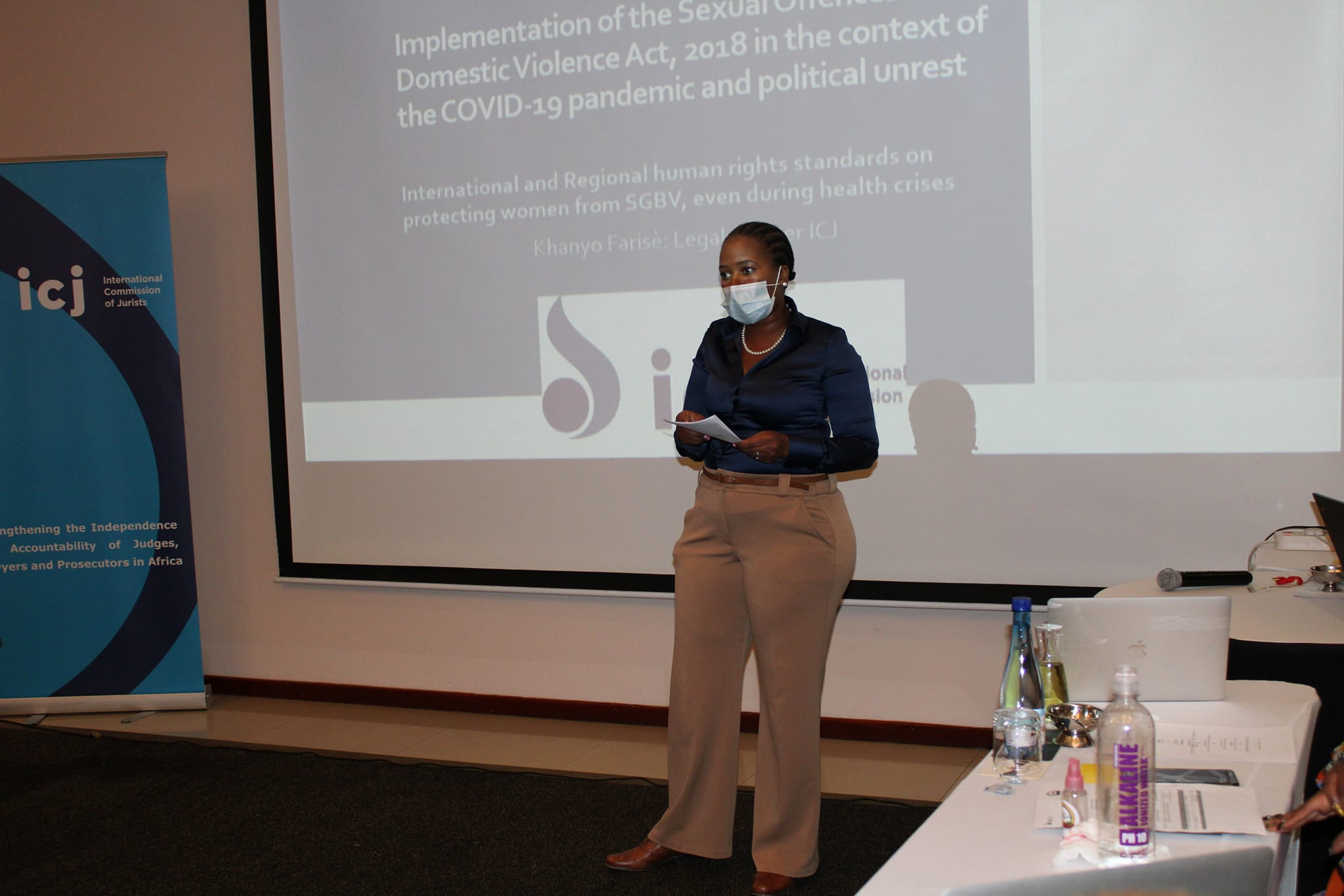During a recent visit to Eswatini from 2 to 5 November 2021, the International Commission of Jurists (ICJ) engaged with civil society organizations, lawyers, the Swaziland Human Rights Commission and government officials on the local human rights record. The ICJ subsequently filed a submission to the ACHPR documenting its findings, and supported the drafting of a separate submission by the Foundation for Socio-Economic Justice (FSEJ) in Swaziland. These submissions draw on the ICJ’s human rights work on Eswatini over more than a decade, as well as on the FSEJ’s continued human rights advocacy and monitoring in context of the current pro-democracy protests.
The ICJ has been following with grave concern the unfolding human rights crisis in Eswatini, following the police’s allegedly unlawful killing of student Thabani Nkomonye in May 2021. This incident ignited pro-democracy protests in the Kingdom, one of the last remaining monarchies in the world, which continue to this day. Among other things Protestors have been calling for: the lifting of the bang on political parties; a meaningful, safe and transparent process of national dialogue leading to democratic change; and the release of all political prisoners, including two members of Parliament, Mduduzi Bacede Mabuza and Mthandeni Dube.
“We are concerned that the fair trial rights of Mabuza and Dube were violated and that they were arrested unlawfully and with an improper purpose. They have been denied bail twice without a legitimate reason,” said Kaajal Ramjathan-Keogh, ICJ Africa Director.
The protests show no sign of abating. ICJ notes with concern reports that more than 80 people have been killed by security forces since May, with allegations that many, if not all of these killings, were arbitrary and unlawful. A recent report of the Swaziland Human Rights Commission has confirmed at least 46 of these deaths, many of which have been at the hands of security officials during the course of protests or due to suspicion of involvement in protests.
The ICJ submission draws the ACHPR’s attention to violations of a range of Eswatini’s obligations under the African Charter on Human and Peoples’ Rights and the African Charter on Human and Peoples’ Rights on the Rights of Women in Africa.
As part of their attempt to control the spiralling protests, the Eswatini authorities have, on at least two occasions, ordered both general and partial internet and telecommunications shutdowns. These directives were issued by State authorities, including by the King’s daughter, Princess Sikhanyiso Dlamini, who is the Minister of Information and Communications Technology.
“The internet shutdowns appear to be implemented for the particular purpose of suppressing protest. Neither the directives issued by the government, nor the decisions by internet service providers, such as MTN to accede to them, are compliant with international human rights law and standards,” said Ramjathan-Keogh.
The repressive environment created by the authorities has also exacerbated a range of pressing social problems in Eswatini, including high rates of domestic and gender-based violence.
“During the engagements between the ICJ and local civil society organisations, participants explained some of the effects of the COVID-19 pandemic and the ongoing political unrest on women, in particular. For example, under lockdown, there have been many instances of women being subjected to sexual and gender based violence by their abusive partners, and the survivors were not able to access domestic violence shelters,” added Ramjathan-Keogh.
In its submissions, the ICJ requests the ACHPR, which will consider Eswatini’s report on 24 November, to recommend that the Eswatini authorities take a range of measures, including:
- Immediately stop the unlawful killing of protestors, and put an end to arbitrary arrests and the clampdown of peaceful protests;
- Drop charges against human rights defenders, including arrested MPs Mduduzi Mabuza and Mthandeni Dube, and ensure the protection of the right to a fair trial;
- Immediately halt internet shutdowns, and publicly commit to refraining from the use of internet shutdowns during protests; and
- Ensure full access to healthcare services, as well as access to shelters and alternative accommodation for survivors of gender-based violence.
Download:
ICJ’s submission to the ACHPR.
FSEJ’s submission ACHPR.
Contact:
Kaajal Ramjathan-Keogh, ICJ Africa Director, e: kaajal.keogh@icj.org
Tanveer Jeewa, Legal and Communications Officer, e: tanveer.jeewa@icj.org
Additional resources:
Recent relevant statements and publications of the ICJ in respect of Eswatini include:
- Eswatini: ICJ facilitates integrated meeting of justice sector stakeholders involved in combatting sexual and gender-based violence
- Eswatini: Justice sector meets to discuss implementation of the Sexual Offenses and Domestic Violence Act
- Eswatini: ICJ hosts symposium on combating sexual and gender-based violence
- Eswatini: Avoid use of live ammunition and internet shutdowns in response to pro-democracy protests
- Eswatini: Police must respect people’s right to stage protests in demand of representative government
- Eswatini: ICJ urges multinational mobile telecommunications company MTN to immediately restore internet access
- Eswatini: Children must be protected as authorities crackdown on protests





